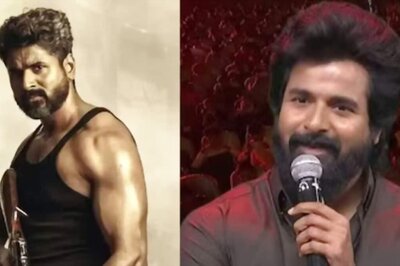
views
Feisty in his critique of the ruling political establishment of the country, Professor Amartya Sen on Thursday said the BJP government is using the Ram Mandir issue to distract attention from serious issues like unemployment and economic policies
The Nobel Laureate said this systematic cultivation of divisions along with the growing intolerance and undermining of institutions has him worried him as he sat down with News18 for an interaction in Shantiniketan.
The wide-ranging conversation also spanned issues like BJP’s governance, quota politics, the controversial Citizenship (Amendment) Bill, farm loan waivers, the upcoming elections and the opposition parties’ efforts to stitch a grand alliance.
Below are the edited excerpts of the conversation:
From what I have gathered about some of your statements that you have made in the recent past concerning some recent incidents in this country, you seem to be a worried man. What are your foremost worries?
I am concerned that the economic, political and social policies have a lot of problems which need rectification. But much more importantly, I am worried about the cultivation of an atmosphere of intolerance that has been a part of polices that’s been pursued over the last few years. That, along with a systematic undermining of institutions, including universities and going all the way to the courts… I think these are concerns that would make any Indian citizen deeply worried.
Recently, we have had some examples that created stirs in the Indian society. Like what happened with actor Naseeruddin Shah. Poet Srijato Bandhopadhyay was heckled by a group of people who did not like what he wrote in one of his poems. Are you drawing attention to these specific incidents? Do you worry that these voices are getting subdued by the powers that be?
Yes, I think they have been. If you look at individual incidents, you’ll find so many of them across the country where intolerance is the most prominent face that the authorities are projecting. But going beyond that, there is a general concern that there is a kind of systematic cultivation of these divisions. Even the attempt to focus so much on the Mandir as opposed to Babri Mosque is itself one of those cases of trying play up the communal division. If you are talking about citizenship, it’s amazing that you could find room for non-Muslims in the neighboring countries for citizenship while you don’t have that for the Muslims, even though Indian rulers must know that there is the huge amount of intolerance and ill-treatment going on with the Rohingya Muslims in Burma.
They are Muslims and they are our neighbours and they certainly deserve the same kind of sympathy as non-Muslims minorities who get into difficulties in the neighboring countries. So I think there is a systematic bias in governmental thinking. There is also an attempt to excite the public opinion and the example you gave about the poet in Assam and Naseeruddin Shah - these are cases where the public has been made excited to deal with it. This whole cow movement was again to excite people about the mal-treatment of cow or the eating of cow. And then you get a lot of people to come up and try to kill off others. And when they are done by institutions, whether it’s the government or whether it’s a Hindutva-related organisation, I think what we see is an organized attempt at making the country smaller, meaner, nastier and more divided. And I think this is very upsetting.
Do you think issues like Gauraksha, Sabarimala and Ram Mandir are being highlighted to obfuscate the real issues that confront India?
As a social scientist, I have to resist having a simple explanation for everything. Certainly, these distract attention from really serious issues like unemployment and the fact that the economic growth in India, though high, has not been translated into better lives for the poor. And yes, in this context to be able to concentrate on Gauraksha or the Mandir, certainly distract attention. Whether that is the only reason why that’s happening, I don’t know. There are a lot of people crazy enough to regard Gauraksha to be much more important than Manav-raksha. And they would like to pursue that. Similarly there are a lot of people crazy enough to regard the debate about a temple, that may or may not have existed and no one has seen and which was replaced by a mosque which has been demolished, and to put back a mythical story back to circulation and make it the central piece of Indian history with Ram being born there and so on… it’s an extraordinary construction of the past. That’s not the past that historians recognize. So, I think, yes there’s a bit of attempt to distract people, obfuscate and so on.
There are those who would also call this a ploy to tide past the 2019 elections, which are barely a few months away. Would you also agree with that logic?
Again I will say this helps the sectarian parties, particularly the BJP and behind it, the RSS. Certainly. But again to take a scientific point of view, somewhere to jump to conclusion that’s the only reason why this is being done and not because people are crazy enough to hate rationalist thoughts would be an over simplification. I don’t want to do over simplification but I would certainly say yes, it does help the election. And if Akhilesh and Mayawati join together in UP and stand against Yogi and Yogi retorts in terms of a narrow-minded Hindu pursuit with Gauraksha in it and the Mandir and so on… that helps certainly. But whether that’s the only reason that the Yogi might be interested in it or whether he is really very much involved with the cow and the Mandir is a separate issue.
I think the elections are going to be an important feature of India because in the 2014 election, BJP got a majority with only 31% of the votes. The vote percentage haven’t gone up, it’s likely to have gone down. So I think if it’s well organised, the number of seats that the BJP gets should be far less than what it did in the parliamentary elections in 2014.
Since you brought up the issue of Mayawati and Akhilesh joining hands in UP, Mamata Banerjee is also trying to get opposition leaders under one banner of the federal front. Do you think that the stage is really set to take on the ruling dispensation at this point by the opposition or do you think that the opposition still has a long way to go, that it’s still fractured?
Mamata Banerjee’s record on secularism is certainly very strong and so she can claim that ‘let’s unite together’. There’s no question that the Trinamool is popular in Bengal and has done something to deserve it as well. They have also done a few wrong things. But they have also done a lot of good things, including pursuing the secular route. But there are a lot of people who, despite accepting that Trinamool has done things, do not like what they see as the authoritarianism of the leadership of Trinamool.
Do you think that Mamata Banerjee has it in her to get all these leaders on the same platform under a common banner?
The question is not whether Mamata Banerjee can. The question is, if you are opposed to Mamata Banerjee on whatever grounds, authoritarianism or whatever your particular critique is, who can provide you an alternative? I think a lot of people have been attracted by BJP on grounds that it will provide a solid opposition to Mamata Banerjee. Now, in that context of not having a CPM or a Congress to stand up against Mamata Banerjee makes the BJP stronger rather than weaker. So, it’s not just a question whether Mamata Banerjee has in her to do this. She certainly is very able leader and one of the ablest in India, I would say. On the other hand she can’t prevent the fact that these people are looking for an alternative. If there is no viable CPM, they would tend to go to the BJP. And therefore, having a powerful CPM or Congress actually is not only disuniting the secular front, it is also helping people not to go to BJP as the only alternative that standing up on the ground. So, it’s a more complicated story. And I think, taking everything into account, the case for CPM and Congress to stand on his own ground having a secular opposition to Mamata Banerjee but enormously committed to against Hindutva and BJP, is not an unviable position for CPM and Congress to take.
You have maintained in the past that there’s a need for non-communal, non-BJP parties to come under one platform. Do you see any such thing happening in the 2019 elections?
Well, I would agree to it in a conditional way. I think it would be important to a great extent in Orissa. I think it would very important in places like Haryana, and Punjab. However, just as I was discussing in the case of Bengal, having a second non-BJP and secular party makes BJP weaker rather than stronger. So, we have to look at the issue in a more complicated way. But for India as a whole, yes, for the non-communal, non-sectarian parties to unite in general, there’s a strong case for it. But we have to think also of cases like in Bengal, where there may be people fairly satisfied with Mamata Banerjee, yet wanting an alternative and not finding it in the CPM. And there’s a complication there.
You have called this decision to implement upper-caste quota a result of “muddled thinking”. Do you think this would have an impact on the Indian social and political fabric in the long run?
Well, it’s hard to say. But it certainly is muddled thinking because the caste system has a long history and when the reservation was brought in, it wasn’t because some people are disadvantaged today. It was because there is a long history whereby even if they overcome some of these problems, the disadvantage from which the untouchables and the low caste suffer will not go away. And that’s why the caste system was the appropriate basis for reservation. It does not quite apply to relatively poor people who happen to be Brahmin or Banya and so on. And there you have to see to what extent reservation is a good way to dealing with economic inequality. I think economic inequality is best dealt with by economic policies, rather than by reservation policies. That’s why I would say that this is muddled thinking because what applies very well to hardened caste, social barriers, including untouchability and scheduled tribes, doesn’t apply that easily to economic inequality. It can also end up being a substitute for good economic policies where the poor can be made to have good employment, good education and good healthcare, which make them competitive forces in the market. And if that happens, that would do a lot more than giving reservation to the relatively poor among the upper caste.
You have briefly touched upon it, but I would like your comments once more on issues such as the NRC and the Citizenship Bill?
Well, I think the citizenship should have nothing to do with your religion. That’s the main thing. And that’s a Constitutional Principle. It’s a principle on which the Constitution is based. There were a lot of discussions on that in the Constituent Assembly when India was becoming independent. And therefore, to begin something which privileges non-Muslims over Muslims is, I think, a real violation of the Constitutional Principle of neutrality over religious differences.
And you think NRC will also divide the society?
Well we have to see. It depends on how much we resist. I think there has been a lot of resistance, and hopefully, we might be able to resist that. But it can, yes, certainly.
But there are some who would say that these are desperate and populist measures ahead of the 2019 elections? Talking about populism, even the Congress is not outside the ambit as well. In the states they have recently won they took barely hours to announce farm loan waiver and there are economists who say that farm loan waiver is not the solution for rural woes in India. Your opinion?
Farm loan waiver is a complicated question because it has two aspects. One side is it violates the financial principle that if you have a loan, you ought to return. On the other side, it actually helps people who are right now in great need and who may have to sell their land and that may be a very unfortunate thing to happen. So it not the case that farm loan waiver has no positive side to it. It is a mixed story. It’s not entirely populism. Surely, there is a populism element to it, which is why it appealed, but it’s not devoid of a measure of equity. If you look beyond the trees here you’ll see between here and the rice mills in Bolpur which used to be the paddy fields, it’s full of houses now. These were all mostly owned in small plots by very poor people, mostly Adivasis. But they fell behind in economic terms and had to sell the land mainly because they had taken loan which they had to pay back. And if there was a loan waiver they could have saved their land and kept on going being a cultivator which they didn’t have the option to do and had to sell their land.
So, in both short term and term, loan waiver has a positive impact on the rural economy?
It does have a positive impact. It’s not the only impact that it does have. Because ultimately, Raghuram Rajan and others are right, that if you want to have a good market economy then loans are something if you take you ought to return. So I think it’s a complicated question. What I am saying is that loan waiver is not just populism, it’s has an equity aspect as well as populist aspect.
You referred briefly to the so-called undermining of institutions. Coming to that, as far as the RBI is concerned, the manner of exit of two immediate past governors, Raghuram Rajan and Urjit Patel, made the opposition cry hoarse that the autonomy of the institution has been compromised. Do you also agree with that?
Well, that’s a much more complicated story... partly because RBI has never been entirely independent of the Government of India. The Ministry of Finance has always had a say in running things in the RBI. So, what has happened here is that under a good leadership - and I think Raghuram Rajan would be a very good example of an excellent economist who could provide a different perspective to the government - the fact that RBI lost its independence was very unfortunate.
To some extent, the same can be said about Urjit Patel. But if not in general, as much of an extraordinary elimination of autonomy as say, the autonomy of universities, autonomy of institutions like Indian Council for Cultural Relations, Indian Historical Congress and so on, these have been so strongly undermined, and filled with government characters. I am not using the word, stooges, being placed there. I have seen since I was running the Nalanda University how, when the government decided to play havoc with it, they actually changed it. So instead of what was the oldest university in the world being continued in the present with an interest in arts and science with a Buddhist heritage, today it’s become much more of a Hindu institution… there is much more interest in the cow rather than in science. And I personally think Nalanda should be renamed. It has relatively little to do with the old Nalanda.
Do you have a name in mind?
No… It could be any name other than Nalanda. It would eliminate that pretension that it is a continuation of that fifth century fine educational institution of the world.
Talking about threat to democracy, there’s something ironic happening here in Bengal where it is the BJP who’s alleging that Mamata Banerjee is a serious threat to democracy. Do you have an opinion on how things are playing out in Bengal? Do you think that there is a threat to democracy here?
The reason that the BJP has given, I don’t see that argument stand because any religious festival can be converted into a communal-political event. That happened a lot in the 1940s. Durga Puja, the Muharram, the Eid were used as ammunition to divide Bengal. The Rath Yatra would not be very different from that. Something which has not had a long tradition of being a part of the Bengali culture, to introduce that bearing in mind that it may communally divide, has huge danger. I mean, Ram Navami has been used like that. I don’t remember as a child people going around with swords in Calcutta’s streets on Ram Navami. So, I think it is very difficult to construct a story that the BJP is trying to construct here that this is a threat to democracy rather than an attempt to save Bengal from having a further dose of communal strife.
A lot is expected to play out in days ahead, in the run up to the 2019 General Elections. Sometime back you said in Kolkata that even if there change in regime in 2019, if that happens, the change in public policies may or may not happen. Why are you skeptical that a change in regime may not actually bring about a change in public policies?
Well, it may. I am not saying that it will not. But the chances of not doing it will be greater unless we keep watching and keep saying to make sure that it does bring about a change. After all, the Congress has a long history of running the country without tackling some of the central concerns, namely bad school education and bad basic healthcare. They have done relatively little about that in the past. And if they have to have a big change, they have to not only do a lot better than what the BJP has been doing but a great deal better than they themselves have been doing before the BJP came into office. And therefore, I think, it is very important to constantly and persistently ask the question whether when new government comes what will it do? We have to remind them that the job is not only to defeat the BJP, not only to end the communalism that the present government has cultivated, but also to do many positive things which historically India has failed to do. And therefore, it’s a bigger task than just defeating the BJP.




















Comments
0 comment